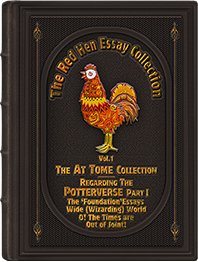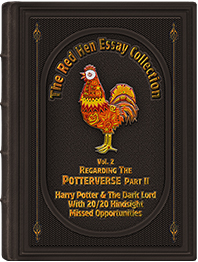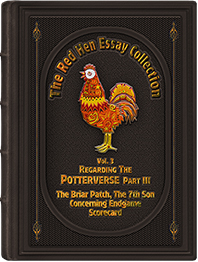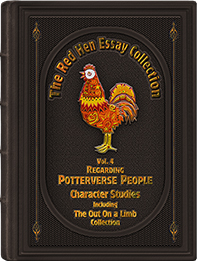Not Everything Here is Fanfic
A bit of Background:
In the days of yore, back when the essay collection was still evolving, and was given a full revision on a 6-month basis, there were occasionally people who asked if I would make the collection available in .pdf.
There is no way that I could have been able to keep a downloadable collection in sync with a still evolving online version. The collection kept *growing* and I did still have a day job back then. However, I no longer have that day job.
The glitchy dropdown menus of the previous iteration of the site made replacement a matter of some urgency. So, as of April 2024 the essay collection had not yet been given a full revision. This kind of thing goes in stages. At present, now that the .pdf rebuild is complete, I needed to roll the most recent edits back into the online versions.
I should probably note that since I am an incrementalist, the act of bringing the .pdf version of the collection into compliance did indeed generate further modifications. It may take a while for these to be retrofitted back into the online version.
As of July 11, 2024, both collections are now in sync with each other.

A Brief History of the Collection.
On Halloween, 2002 the first iteration of the Red Hen Publications website was uploaded to the internet.
It did not at that point include anything like an essay collection.
On April 30, 2003 the site was given its first 6-month revision and a collection of some 30 essays, most of them on Potterverse subjects, was added. Over the following years, the site recieved semi-annual updates on Halloween and April 30 until roughly a year after canon was closed. During this period the essay collection expanded beyond all expectations.
After 20 years online, the collection is finally showing signs of coming close to the end of its development cycle. I know better than to claim that there will be no further development. But what development seems likely is probably going to be minor. Therefore, it finally seemed safe to build a downloadable version.
It should be noted that this is an attempt to duplicate the online version of the collection, pretty much verbatum. Consequently, there is a great deal of repeated material, since online, it is impossible to know just where any reader will start reading the collection or how much of the background inforation of the foundational theorizing they might already be aware of.
So, although it all connects, it is recommended that the reader approach each of the essays as an individual entity.
.

Red Hen Essay Collection: Volume 1
Uncompressed File for online reading (6.8 MB)
Compressed Low-Res File for download (5.3 MB)
Including the At Tome collection of general essays on Books, Reading, and Fandom.
Potterverse Essay collection; “Regarding the Potterverse: Part I, composed of the online sub-collections; “The ‘Foundation’ Essays”, “Oh Wide, Wide (Wizarding) World!”, and the combined timeline essay of: “O, the Times are Out of Joint!”
Note: This volume of the collection has updated and in in compliance (or beyond) with the online collection.
.

Red Hen Essay Collection: Volume 2
Uncompressed File for online reading (7.3 MB)
Compressed Low-Res File for download (5.6 MB)
Potterverse Essay collection; “Regarding the Potterverse: Part II, composed of the online sub-collections; “Harry Potter & the Dark Lord”, “With 20/20 Hindsight…”, and “Missed Opportunities”.
Note: This volume of the collection has been updated and in in compliance (or beyond) with the online collection.
.
.
.

Red Hen Essay Collection: Volume 3
Uncompressed File for online reading (6.1 MB)
Compressed Low-Res File for download (4.8 MB)
Potterverse Essay collection; “Regarding the Potterverse: Part III, composed of the online sub-collections; “The Briar Patch”, Out on a Limb…, “The 7th Son Collection”, “The Endgame Assortment”, and “Scorecard”.
Note: This volume of the collection has been updated and in in compliance (or beyond) with the online collection.
.
.
.

Red Hen Essay Collection: Volume 4
Uncompressed File for online reading (8.5 MB)
Compressed Low-Res File for download (6.8 MB)
Potterverse Essay collection; “Regarding Potterverse People”, composed of the online Character Studies.
Note: This volume of the collection has been updated and in in compliance (or beyond) with the online collection.
.
• • • •
Regarding Red Hen — Who is not J.K.Rowling — and the Harry Potter series:
Just about anyone who encounters the Red Hen Essay Collection, either in the individual posted online essays or in these collections of .pdfs, rapidly discovers that I am among those fans who believe that J.K.Rowling completely failed to bring the Harry Potter series to a satisfactory conclusion.
That does not mean that I retroactively reject the whole thing. Nor should anyone with a grain of common sense expect me to. No more than I will retroactively spurn a particularly engaging fanfic which turns out to have been abandoned by its author two-thirds though the story arc. I may continue to regret or deplore its perpetual WiP status, but I do not reject it.
As stated in more than one of these essays; Rowling sold us this story, and we, the fans, chose to keep it.
Not all fans are necessearily readers, and the majority of readers are not necessarily fans. But those of us that are, are.
And, in any case, for me, one primary draw was the opportunity to build theories.
I think without excessive hubris, that there is some very good theorizing in this collection of essays. And the very fact that I was able to develop those theories from material which is actually in the books suggests that Rowling’s incompetence at bringing the series to a satisfactory conclusion is not based on an inability to string together a coherent plot.
But, I very much suspect that that “incipient burnout” Rowling admitted to when she first announced taking a break after GoF was released, wasn’t incipient at all. She had also claimed at the time that she had fallen into a major plot hole in the middle of writing GoF, and had ended up having to rewrite nearly a third of the book to patch it. This, on top of knocking out and readying four books for publication in four years…
Burnout is hardly to have been wondered at.
I suspect that it was no controlled descent, either. That it was, in fact, a spectacular crash and burn.
She also desperately needed a beta (or competent editors — who could count), and she didn’t get either one. The editors did a piss-poor job on continuity from the beginning, and by the end they were barely going through the motions.
• • • •
After the fact, I also am inclined to think there was a flaw in the master plan, which had always been lurking there to bite her. And it was one that she could not eradicate, or write her way around by the time she found herself having to grapple with it.
In plain words, it is my opinion that the main premise; that this was, at the heart of it, the story of a wizarding war, was poorly thought out from the get-go. I do not believe that Rowling had ever given any considered thought to how a “wizarding war” would even work. She also would appear to be under the impression that the concept of such a war is somehow “romantic”. In the “sweeping glory”, or “heroic” sense of the term.
That is regrettable. I doubt that anyone who has ever lived through a war that actually touched the country that they were in would ever regard one as either romantic or heroic. Sure, romantic or heroic stories may come out of a war, but a war itself is no such thing.
And indeed over the whole first half of the series, before we ever had to deal directly with this so-called “wizarding war,” the story worked. Once we reached the point where we were forced to deal with this “war,” it didn’t.
Rowling seems to have no more idea of how a war, let alone a wizarding war, works than she does of how one actually makes a Horcrux. Consequently it ends up feeling as if she’s trying to hang her story on a set of hooks that she installed upside-down.
And I suspect that she did not realize this until she reached the point that she was forced to have to deal with it. And by then it was too late.
• • • •
I am inclined to think that Rowling made an honest effort to pick up the threads and continue the story after her 3-year break when she finally sat down to write book 5. But she either really wasn’t ready to continue it yet, or that book went completely out of control in the writing of it, and that made her gun shy. If she hadn’t been locked into a contract I don’t think she ever would have written books 6 or 7. By now, looking over the series as a whole, it seems fairly clear that she didn’t really want to write books 6 or 7. Only (perhaps) a few individual scenes from them.
Book 6 appears to be some other story altogether which doesn’t actually connect to anything that was going on in books 1-5, and the only things we got out of it that were relevant to the series as a whole were Horace Slughorn and the concept of Horcruxes. Plus, of course, finally hustling Albus offstage for the duration. We did need to do that or people would have kept looking to him for answers (not that he had ever actually given us useful ones). But the rest of that detour was just padding with a fake mystery pasted on.
Book 7 was fake from end to end. I called that book a hoax when it first came out, and more and more I’m convinced that I was absolutely right.
Rowling also left the landscape littered with UXBs. She was very good at loading “Checkov’s guns”. To the point that I find it hard to believe that so many of them had never meant anything. In the first half of the series, I think they would have meant something, or they wouldn't have been there. They do make excellent jumping off places for theories, and as resources for the fanfic authors who want to spin something off from something in the books that was actually there. But none of those guns were ever fired over the course of the series, and that is not playing by the accepted rules of managing dramatic tension.
And in the end she attempted to palm us off with the claim that the only thing that mattered was exclusively tied up in getting rid of Tom Riddle. Which she did, so her job was “obviously” finished.
After having taken several volumes showcasing a dystopian collection of injustices and inequities that pretty much went all the way to be very foundations of wizarding society, none of which had anything to do with Tom Riddle.
• • • •
So, as far as I am concerned, the Harry Potter series is Not Finished.
If there are further developments to any of the essays, it will be noted on the “What’s New?” page and will eventually be incorporated into these documents. That may take place at a lag in time and the edited .pdfs will also be noted among new developments on the “What’s New?” page.
Since I cannot imagine that anyone would want to print these, they have been exported at screen resolution. A screen-resolution .pdf does not blur the text, so they should be quite readible.
